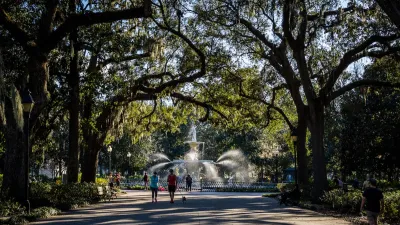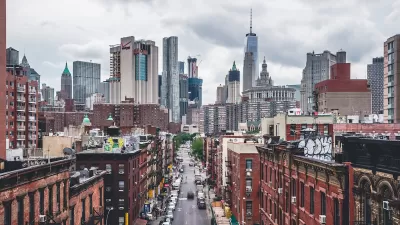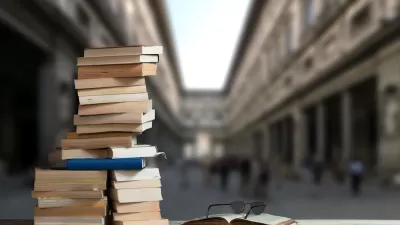One of the perks of my job is getting to know new cities and neighborhoods. We research, create a lot of graphics and talk with a lot of people. In the course of those discussions, while people often exhibit pride in where they live, there is also an underlying concern that frequently goes something like this: “We feel like a last place team – the one that can never get out of the cellar.” “There is a real self-image problem here.” “You can’t do that in [insert name of place here] because we
One of the perks of my job is getting to know new cities and neighborhoods. We research, create a lot of graphics and talk with a lot of people. In the course of those discussions, while people often exhibit pride in where they live, there is also an underlying concern that frequently goes something like this:
- "We feel like a last place team – the one that can never get out of the cellar."
- "There is a real self-image problem here."
- "You can't do that in [insert name of place here] because we're different than other places."
- "There's a community inferiority complex here."
- "Too many people see what's wrong and not what's right."
Sound familiar? It seems many places are afflicted with a lack of self esteem. It's hard to measure that kind of problem. Even harder to point a finger at a solution. If you're an individual and have some self doubt, maybe you would consider picking up a self-help book. Or perhaps therapy? Is there such a thing as urban therapy? I suspect a few places would schedule regular visits.
The self-help craze offers some typical solutions to fixing self esteem: "change negative thoughts to positive ones," "reinforce a positive self-image," etc. I chuckle when I see these kinds of statements as I'm often reminded of Stuart Smalley. For those reading this that are too young and / or believe that Saturday Night Live started with Will Ferrell, please consult the web. Stuart Smalley's daily affirmation – "I'm Good Enough, I'm Smart Enough, and Doggone It, People Like Me!" was always delivered with such transparent disbelief that it became a popular way to criticize the quick, self-help, fix.
But given the popularity of this stuff, maybe we should take a quick moment to find some inspiration from self-help guidebooks. So I did a quick Google search to see what's being peddled nowadays. I even added the word "cities" to see what would come up. Alas nothing but in the course of that procrastination Google I found some sites with the germ of a few potentially valuable ideas. The emphasis on "taking care of yourself" for instance often refers to improved physical health. Today, exercise and nutrition are increasingly discussed as an urban planning problem but I hadn't thought of them as also a boost to urban self-esteem. Perhaps feeding the mind of the individual will bubble up to the scale of the community if enough people are involved. Take other typical self-help ideas - "make your meals a special time" made me think of the well-organized community dinners and roving block parties some cities support. I also personally like the idea of a "celebratory scrapbook" that could be created by neighborhoods as sort of a window into their values and successes.
Then there is the "mutual complimenting exercise" or self-affirming lists that Stuart Smalley loves. As odd as it sounds, I think there's some value in this at the community level. In past planning projects when we've asked people to define their successes as a community and not focus on the problems, we're often presented with a lengthy and robust list. People are indeed quite proud of their neighborhoods. They just need excuses to talk positvely about them which is in part what a plan can help facilitate.
Of course none of these, what I would call additive measures, replaces a real physical and economic transformation - the kind that comes with sustained and smart investment. But they might help set the stage to make that investment a little easier to come by.
Or maybe cities just need the real quick fix – a winning sports team. I laughed out loud this morning when I heard the following on NPR – "I'm so excited!!! Philadelphia finally won something." Is Stuart Smalley a Phillies fan?

Alabama: Trump Terminates Settlements for Black Communities Harmed By Raw Sewage
Trump deemed the landmark civil rights agreement “illegal DEI and environmental justice policy.”

Planetizen Federal Action Tracker
A weekly monitor of how Trump’s orders and actions are impacting planners and planning in America.

The 120 Year Old Tiny Home Villages That Sheltered San Francisco’s Earthquake Refugees
More than a century ago, San Francisco mobilized to house thousands of residents displaced by the 1906 earthquake. Could their strategy offer a model for the present?

In Both Crashes and Crime, Public Transportation is Far Safer than Driving
Contrary to popular assumptions, public transportation has far lower crash and crime rates than automobile travel. For safer communities, improve and encourage transit travel.

Report: Zoning Reforms Should Complement Nashville’s Ambitious Transit Plan
Without reform, restrictive zoning codes will limit the impact of the city’s planned transit expansion and could exclude some of the residents who depend on transit the most.

Judge Orders Release of Frozen IRA, IIJA Funding
The decision is a victory for environmental groups who charged that freezing funds for critical infrastructure and disaster response programs caused “real and irreparable harm” to communities.
Urban Design for Planners 1: Software Tools
This six-course series explores essential urban design concepts using open source software and equips planners with the tools they need to participate fully in the urban design process.
Planning for Universal Design
Learn the tools for implementing Universal Design in planning regulations.
Clanton & Associates, Inc.
Jessamine County Fiscal Court
Institute for Housing and Urban Development Studies (IHS)
City of Grandview
Harvard GSD Executive Education
Toledo-Lucas County Plan Commissions
Salt Lake City
NYU Wagner Graduate School of Public Service






























